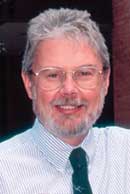From the Director
by Lee Allison,
Director and State Geologist

Over
the past decade, the budget of the U.S. Geological Survey (USGS), the
federal counterpart to the Kansas Geological Survey, has fallen far behind
that of other federal science and research agencies. That shortfall affects
not only the USGS, but the ability of the larger earth sciences community
to meet the challenges before us. The budget for the National Institutes
of Health has more than doubled in recent years, and the budget for the
National Science Foundation is approved to double in the next five years.
So while more extensive and sophisticated data and analyses are gathered
in other fields to address critical issues such as water quality, climate
change, and hazards, the earth sciences are not keeping pace.
USGS funding affects the Kansas Geological Survey directly. The KGS annually
submits proposals to the USGS to carry out cost-shared geologic mapping
of the state under the National Cooperative Geological Mapping Program.
However, almost since the program’s inception a decade ago, the
President’s annual budget has cut or eliminated funding for this
program and other popular cooperative programs. While these cuts eventually
have been restored, the Mapping Program is still not close to being funded
at its authorized levels.
To address these issues, professional and academic organizations, industry,
and leading scientists have formed the “Coalition for the USGS”
to work with Congress, the Office of Management and Budget, and the White
House to stabilize the budgetary environment for the USGS and look at
long-term needs in the earth sciences.
Our concern is not only with funding for the USGS. Other federal earth
science programs are just as important to Kansas and other states. About
two-thirds of the federal contracts and grants the KGS received in recent
years came from the Fossil Energy program of the U.S. Department of Energy.
These federal dollars are leveraged with state and industry dollars to
make Kansas a leader in applied research aimed at extending the life of
the state’s oil and gas fields. But funding for the Fossil Energy
program is budgeted to drop almost by half in the next fiscal year.
Federal funds help fill the gaps in the KGS budget resulting from state
funding reductions. KGS has joined the “Coalition for the USGS,”
but we are urging the group to broaden its agenda to look at funding needs
for all earth science activities in the federal government.
The time for the next step, a “Coalition for the Earth Sciences,” may have arrived.
![]()
Online July18, 2003
Comments to: lbrosius at kgs.ku.edu
Kansas Geological Survey
URL:http://www.kgs.ku.edu/Publications/GeoRecord/2003/vol9.1/Page2.html